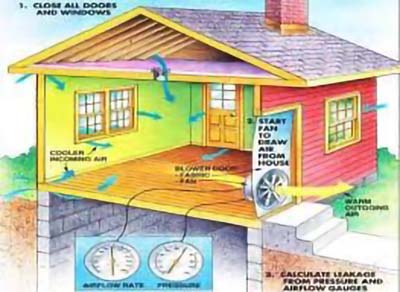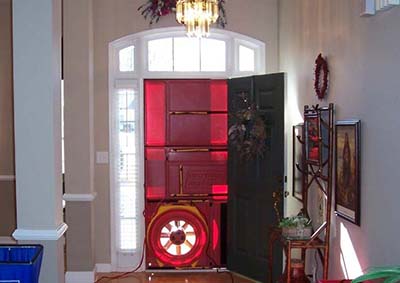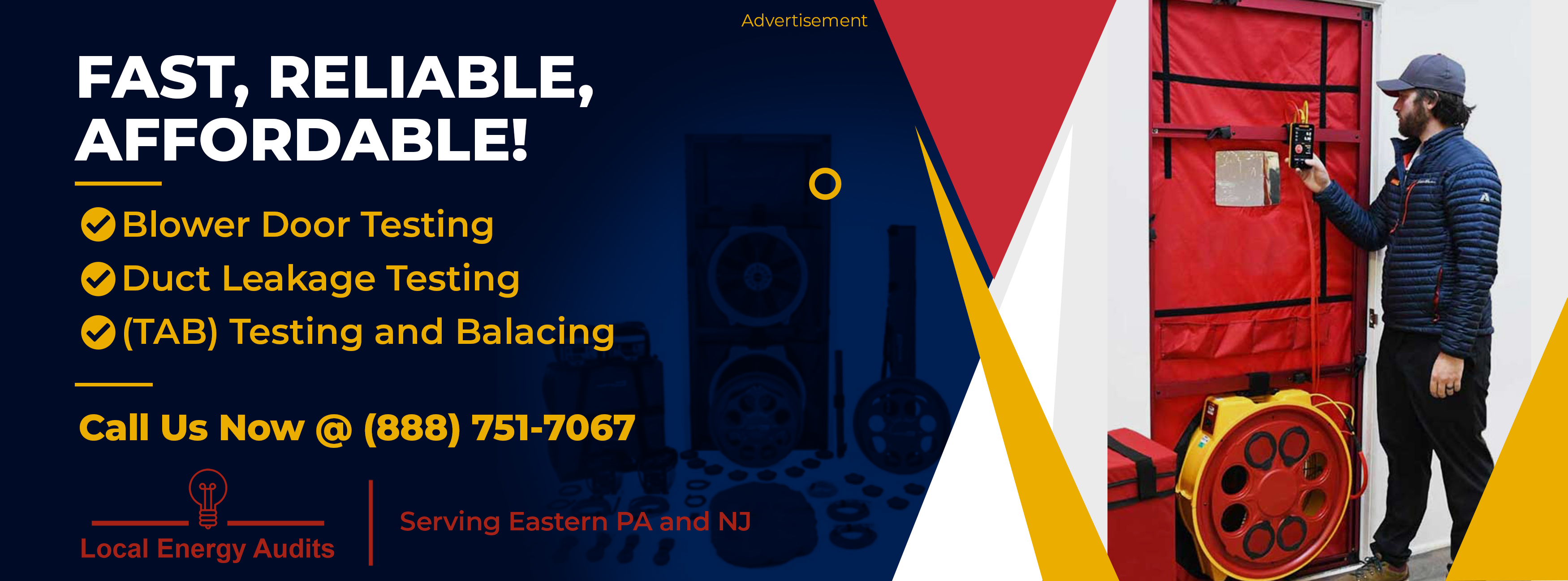The Crucial Role of Blower Door Tests in Pennsylvania's Energy Code Compliance
In the realm of energy efficiency and sustainable construction practices, the state of Pennsylvania is at the forefront, constantly pushing for higher standards of building performance and environmental responsibility. One pivotal tool in achieving these goals is the Blower Door Test, a critical element in complying with Pennsylvania's rigorous energy code standards.

Importance of Blower Door Tests:
Pennsylvania, like many states, recognizes the vital importance of energy efficiency in residential and commercial buildings. A significant portion of energy consumption in these structures can be attributed to air leaks and drafts. This not only leads to energy waste but also compromises indoor comfort and air quality.
To address these concerns, Pennsylvania has incorporated Blower Door Tests into its energy code requirements. These tests are designed to assess a building's airtightness by measuring the amount of air leakage when subjected to controlled pressure differences. Understanding the procedure and significance of these tests is crucial for builders aiming to meet Pennsylvania's energy code standards.
How a Blower Door Test is Performed:
A Blower Door Test is typically performed by certified professionals and follows a standardized procedure:
- Setup: The process begins by sealing all external openings in the building, such as windows, doors, and exhaust fans. A powerful fan is installed in one of the exterior doorways, and a pressure gauge is connected to it.
- Pressurization and Depressurization: The fan is used to either pressurize or depressurize the building's interior. During pressurization, the fan blows air into the building, increasing the indoor air pressure. Conversely, during depressurization, the fan removes air from the building, creating negative pressure.
- Air Leakage Measurement: While maintaining a constant pressure difference, the technician uses the pressure gauge to measure the amount of air being forced in or out of the building. This measurement is expressed in cubic feet per minute (CFM) at a specific pressure level, often 50 Pascals (Pa).
- Analysis and Reporting: The data collected during the test is analyzed to determine the overall airtightness of the building. The results are then documented in a report that includes the air exchange rate, potential areas of leakage, and recommendations for improvement.

Why Passing the Blower Door Test is Crucial:
- Energy Efficiency: The Blower Door Test is a key indicator of a building's energy efficiency. By identifying and addressing air leaks, builders can significantly reduce energy consumption and lower utility bills for building occupants.
- Indoor Comfort: Airtight buildings maintain more consistent indoor temperatures and reduce drafts, enhancing overall occupant comfort and satisfaction.
- Code Compliance: Complying with Pennsylvania's energy code is mandatory for builders. Failing the Blower Door Test can result in costly delays and modifications to meet the code's requirements.
- Environmental Impact: Energy-efficient buildings have a reduced carbon footprint, contributing to Pennsylvania's commitment to sustainability and environmental responsibility.
- Cost Savings: Building owners and occupants benefit from lower energy bills, ultimately leading to long-term cost savings.

In conclusion, the Blower Door Test plays a pivotal role in ensuring that buildings in Pennsylvania meet stringent energy code standards. Builders must recognize its significance not only to comply with regulations but also to contribute to a more sustainable and energy-efficient future for the state. Investing in an airtight building envelope not only benefits the environment but also enhances the comfort and well-being of occupants while reducing long-term operational costs.


PA Energy Code conducts Blower Door Testing in the following areas:
Blower Door Testing in Montgomery County:
- Bala Cynwyd, PA
- Collegeville, PA
- Conshohocken, PA
- East Norriton, PA
- Erdenheim, PA
- Glenside, PA
- Gulph Mills, PA
- Jeffersonville, PA
- King of Prussia, PA
- Lansdale, PA
- Norristown, PA
- North Hills, PA
- Plymouth Meeting, PA
- Pottstown, PA
- Swedesburg, PA
- Upper Dublin, PA
- Willow Grove, PA
- Villanova, PA
- Merion, PA
- Blue Bell, PA
- Limerick, PA
- Hatfield, PA
- Ardmore, PA
Blower Door Testing in Delaware County:
- Chester, PA
- Chadds Ford, PA
- Collingdale, PA
- Darby, PA
- Drexel Hill, PA
- Folcroft, PA
- Gladwyne, PA
- Havertown, PA
- Lansdowne, PA
- Media, PA
- Morton, PA
- Radnor, PA
- Springfield, PA
- Swarthmore, PA
- Upper Darby, PA
- Woodlyn, PA
- Wayne, PA
- Yeadon, PA
- Ridley, PA
- Haverford, PA
- Aston, PA
Blower Door Testing in Bucks County:
- Abington, PA
- Bristol, PA
- Doylestown, PA
- Hatboro, PA
- Levittown, PA
- Langhorne, PA
- Morrisville, PA
- New Hope, PA
- Newtown, PA
- Perkasie, PA
- Quakertown, PA
- Southampton, PA
- Bensalem, PA
- Warminster, PA
- Warrington, PA
Blower Door Testing in Chester County:
Blower Door Testing in Northampton County:
Blower Door Testing in Lehigh County:
Blower Door Testing in Lancaster County:
Blower Door Testing in Berks County:
Blower Door Testing in Huntingdon County:
Blower Door Testing in Philadelphia County:
Blower Door Testing in Erie County:
Blower Door Testing in Lackawanna County:
Blower Door Testing in Luzerne County:
Blower Door Testing in Monroe, Carbon, Pike, and Wayne County:






